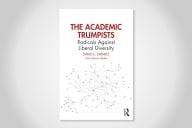You have /5 articles left.
Sign up for a free account or log in.
COLLEGE PARK, Md. -- The organizers of Monday's daylong "Languages For All?" conference at the University of Maryland said more than once that the event, in the words of the university's Director of Language Policy Initiatives Richard Brecht, "is not about advocacy, this is about inquiry." But it was clear that the 150 or so professors, researchers, policy makers and government employees in attendance vehemently promote at least one stance: that languages are critical, and that Americans' unwillingness and/or disinterest in learning them is holding the country back.
The question mark in the conference title was deliberate, meant to convey the uncertainty surrounding not just whether the country should make sure all students have the opportunity to learn a second language, but also whether we can.
"It is certainly a noble idea, a necessary ideal for the economic competitiveness and the security of this country," Maryland President Wallace D. Loh said. "But is the ideal the enemy of the practical?"
Ideal because the job market, economic stability and cross-cultural understanding all thrive when people can communicate and integrate successfully. But potentially impractical because government funding is dwindling, language advocates haven't sold their position effectively, and Americans have a tendency (an "embarrassing" one, said Daniel Domenech, executive director of the American Association of School Administration) to assume English is the universal language -- and if you don't speak it, good riddance.
The event was designed to solicit input for a white paper out of Maryland's Center for Advanced Study of Language, which argues that all students in English-speaking countries should in fact gain competence in a second language, and that schools, government and industry can leverage the technological advances to make sure they do.
"The demand for languages other than English has dramatically increased over the past decade to the extent that the current education system can now be seen as failing to provide a critical skill to the majority of this country's youth," the paper says. "Advances in science, technology best practice can make universal access to second languages feasible, but only if scientific breakthroughs are exploited effectively by the formal education system and by the growing language services industry, access to the Internet is universally available, and research-based best practices in language education are identified and promulgated throughout the PK-16 system."
What's at stake spans from more hiring of recent American college grads and less of people from overseas (people who have the language proficiencies employers want), to better communication and more congeniality between the United States and cultures its residents don't understand.
"I want to see the day when we're not listening in on people's conversations, but we're actually part of those conversations," said Michael A. Wertheimer, director of research at the National Security Agency.
But when it comes to college campuses, there's a key message that Brecht, who is chair of the board of trustees for the American Councils for International Education, wants to get across: "J-O-B-S," he said in an interview.
"Higher education has a lot of work to do to get the faculty to understand where the jobs are, and to tune the language programs to those jobs, and then the students will come. It's not the language and literature people that will make the differences in enrollments," he said; it's the engineers, the health care workers, the biological scientists. "Those are the students we want who can learn that they can practice their profession globally and compete in the job market around the world."
Consider Microsoft as an example, Brecht said. The software company is beefing up its supported languages -- all 108 of them -- to become more globally competitive in the time of Google and Twitter. Talking to officials at Microsoft and other businesses about what they need, and bringing them to campuses, will clarify what graduates will need linguistically to do things such as accounting abroad or software engineering in newly profitable languages.
"We have to get the supply and the demand in sync," Brecht said. "The businesses are the demand, we just haven't gotten the supply in sync with them."
The breadth of individuals and organizations required to capitalize on this "tipping point" is similarly wide: educators from pre-kindergarten through the university level, government agencies and legislators, businesspeople and policy advocates, to name a few.
"A combination of globalization and immigration, I believe -- we believe -- has changed the mindset of this country, or is changing it, in ways that have never happened before," Brecht said.
Brecht pointed to the Partnership for Languages in the United States, or PLUS, a new consortium of 40-plus institutions that gained backing from top administrators to pay a subscription fee for services to support their language ambitions. The group is by invitation only, and every campus opted in. "That's evidence that something is happening on the campus that's not happening before," he said.
Higher Education's Role
But there is plenty to do in the higher ed realm alone.
Rosemary Feal, executive director of the Modern Language Association, laid out a five-point agenda for college officials, including using technology and preparing teachers who are completely proficient in the languages they teach.
Feal also emphasized the importance of "building alliances" with other campus departments and even community members, "so that language learning is done in an environment of collaboration," and it reaches far more students than just those majoring in German or French or Arabic. For example, Mount Holyoke College turned its Spanish Department into the Spanish, Latino and Latin American Studies department, and involves people who work off-campus. Making languages relate to what students want to do will help campuses attract and keep students, Feal said.
College officials also have a duty to analyze and address the cultural theme that ran through the conference, she said.
"We encourage and force heritage speakers to give up the languages that they came to the United States with, and instead adopt English as a primary language," Feal said. "Until we can find ways to convince the larger public that preserving and developing literacy in those languages of those who already have heritage is a good American value, we still have a long uphill battle."
Higher ed also needs to get its message through to K-12 schools, said Sam Eisen, director of the Language Flagship and director of programs for the National Security Education Program at the U.S. Defense Department's Defense Language and National Security Education Office.
"I think it's incumbent upon higher ed to say to schools what it is that we expect a Spanish student to walk in with," Eisen said, "to articulate what we expect students coming out of K-12 and coming out of community college to have."
At higher ed conferences, it's never remarkable to hear a jab or two directed at Washington. But as a government shutdown loomed, the snark was in higher supply than usual. But Chris Gaston, chief of staff to U.S. Rep. Rush Holt, conveyed a serious-if-cynical thought via prepared comments read aloud at the conference's late-afternoon panel on what the federal government could do to boost language learning, as he dutifully canceled plans to appear because of political gridlock on the Hill.
"When we don't know whether the government will be open tomorrow," Gaston wrote, how could you all make long-term plans?
A few minutes later, Clay Pell, U.S. Education Department deputy assistant secretary for international and foreign language education, said educators and policy makers need to work toward standards so students know their language abilities and programs can be compared, and find data points showing how languages advantage students.
He asked attendees to send feedback to his government e-mail address.
Pell added: "I'll be able to access that till midnight tonight."








